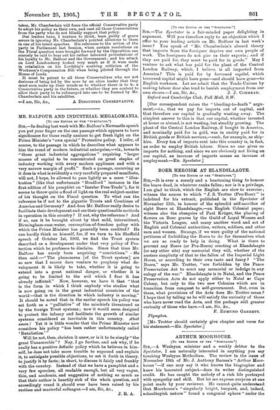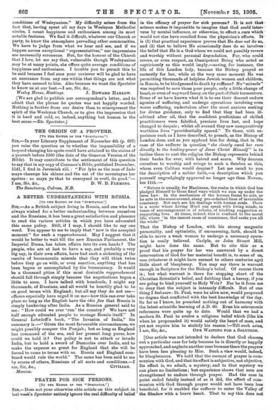Si, — The Spectator is a fair-minded paper delighting in argument. Will
you therefore reply to an objection which I offer to your leading article on Mr. Balfour in last week's issue ? You speak of "Mr. Chamberlain's absurd theory that imports from the foreigner deprive our own people of work. The foreigners do not give us their exports ; and if they are paid for, they must be paid for in goods." May I venture to ask what has paid for the plant of the Central London Railway, which, I believe, is all imported from America ? This is paid for by borrowed capital, which borrowed capital might have gone—and should have gone—to English workmen. Let me admit that the Trade-Unions by making labour dear also tend to banish employment from our own shores.—I am, Sir, !cc., J. J. COXHEAD. Oxford and Cambridge Club, Pall Mall, S.W.
[Our correspondent raises the " bleeding-to-death " argu- ment—i.e., that we pay for imports out of capital, and that therefore our capital is gradually wasting away. The simplest answer to this is that our capital, whether invested at home or abroad, is not wasting, but steadily growing. The plant of the Central London Railway, if bought in America, and nominally paid for in gold, was in reality paid for in British goods or British services,—such, for example, as ship- hire. Every ton of imports sent into this country is, in fact, an order to employ British labour. Since no one gives us imports for nothing, and since we are obviously not living on our capital, an increase of imports means an increase of employment. —ED. Spectator.] BOER HEROISM AT ELANDSLAAGTE. go TEM Ihnros OF TER "SPROTATOR.1 Sin,—It is ever a seemly and a heartening thing to honour the brave dead, in whatever ranks fallen; nor is it a privilege, I am glad to think, which the English are slow to exercise ; witness the source to which "3. S. Trotter (Pro-Boer) " is indebted for his extract, published in the Spectator of November 11th, in honour of the splendid self-sacrifice of eight Boers at Rhondals.agte,—an English Colonial paper; witness also the obsequies of Paul Kruger, the placing of flowers on Boer graves by the Guild of Loyal Women and the Victoria League, and many another word and act of English and Colonial authorities, miters, soldiers, and other men and women. Strange, if we were guilty of the national pettiness of forbidding the Boers to do for themselves what we are so ready to help in doing. What is there to prevent any Boers (or Pro-Boers) erecting at Elandslaagte (or any other site) any memorial they will, whether of the austere simplicity of that to the fallen of the Imperial Light Horse, or according to their own taste and fancy ? "The Boers," says Mr. Trotter, "are forbidden by the Peace Preservation Act to erect any memorial or indulge in any eulogy of the war." Elandslaagte is in Natal, and the Peace Preservation Acts do not apply either to Natal or Cape Colony, but only to the two new Colonies which are in transition from conquest to self-government. But, even in these, what provisions of the Acts does Mr. Trotter mean I hope that by telling us he will satisfy the curiosity of those who have never read the Acts, and the perhaps still greater curiosity of those who have.—I am, Sir, 8t.e., F. EDMUND GARRETT.
Plympton.
[Mr. Trotter should certainly give chapter and verse for his statement.—ED. Spectator.]
ARTHUR MOORHOUSE.
[To TIM EDITOR OP THU "SPECTATOR.]
SIR,—A Wesleyan minister and a weekly debtor to the Spectator, I am naturally interested in anything you say touching Wesleyan Methodism. The review in the issue of November 18th of Mr. J. Anthony Barnes's "Arthur Moor- house "—if one may say it who knows the biographer and knew his lamented subject—does its writer distinguished credit. He has caught the melody of a rich life portrayed with sympathy and skill. But let me express surprise at one point made by your reviewer. He cannot quite understand that Moorhouse's "singularly bright, buoyant, and, indeed, schoolboyish nature" found a congenial sphere "under the conditions of Wesleyanism." My difficulty arises from the fact that, having spent all my days in Wesleyan Methodist circles, I count happiness and enthusiasm among its most notable features. We find it difficult, whatever our Church or party, to know the atmosphere pervading other communities. We have to judge from what we hear and see, and if we happen across exceptional "representatives," our impressions are necessarily erroneous. But, for the honour of the Church that I love, let me say that, vulnerable though Wesleyanism may be at many points, she offers quite average conditions of happiness and enthusiasm. I trouble you to permit this to be said because I feel sure your reviewer will be glad to have an assurance from any one within that things are not what they have seemed to him. Also because we want the Spectator to know us at our best.—I am, Sir, &c., Wesley House, Hastings. J. EDWARD HARLOW.
[We are glad to publish our correspondent's letter, and to admit that the phrase he quotes was not happily worded. Nothing is further from our desire than to misrepresent the spirit of the Wesleyan Church, or to give the impression that it is hard and cold, or, indeed, anything but human in the best sense.—En. Spectator.]
THE ORIGIN OF A PROVERB.
Pro Tea EDITOR OF THE " SPECTATOR:1





















































 Previous page
Previous page